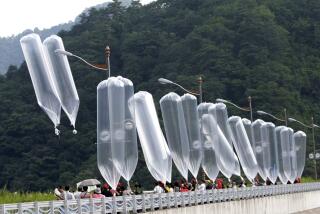South Koreans Watch Romania, Think of North
- Share via
SEOUL, South Korea — South Koreans watched Romania’s revolution stirred by the hope that communist North Korea will see itself in the mirror and decide to change its rigid, totalitarian ways.
Romania’s executed president, Nicolae Ceausescu, was the last hard-line communist leader in the Warsaw Pact. His repressive rule in isolated Romania often was compared to that of North Korea’s Kim Il Sung.
Newspapers and TV stations here exhaustively covered the collapse and a flood of editorials cautioned that North Korea risks similar bloodshed if it fails to change.
“The North Korean leadership may well realize that its days are numbered,” said a Korea Times editorial. Romania, it added, “will hopefully serve as a grave warning to the Pyongyang leadership.”
North Korea quickly recognized the new Bucharest government, saying it regards recent events as an internal Romanian matter and expects to keep its ties with the Romanian people.
Longtime observers saw the North’s move as predictable and a stall for time while it prepares a scenario to explain the new view of the world to a citizenry used to accepting as dangerous any but hard-line communist ideology.
One Western diplomat, speaking on the condition of anonymity, said: “Hope for change is premature. North Korea feels change in East Europe is the result of a bungled bureaucracy and since it has no bureaucracy, it feels it needs no reform and has no problem.”
In addition, North Korea is an Asian nation, not a European one--a nation bordered on the north and west by the Soviet Union and China and on the east by the Sea of Japan. Capitalist South Korea, inaccessible to North Koreans, is portrayed as a beggar country, a stooge of American imperialists.
North Koreans are isolated. They have no access to Western TV, publications or merchandise, symbols diplomats call “singing commercials for capitalism.” Citizens cannot leave the country without permission.
U.S. and South Korean observers see little possibility of a popular uprising in the north. Any hint of dissent is crushed there and the only news is that dictated by the government over government-controlled radio stations.
President Roh Tae Woo of South Korea said in a Christmas address that North Korea is a tyranny which “continues to hold sway, seemingly uninfluenced by the winds of change blowing across so many other communist states.”
Still, Romania is bad news for the communist regime in the north, which has portrayed Romania as a brother state, said Kim Chang Soon, president of the Seoul government-funded North Korean Affairs Research Institute.
“A news blockade may be the only choice they can make,” he said.
Many South Koreans hope the North will see Romania’s collapse as a signal to be more receptive to capitalism and eventual reunification of the two Koreas.
The Korean peninsula was split into communist north and capitalist south in 1945, a 155-mile Demilitarized Zone dividing them. The DMZ is site of one of the world’s greatest military concentrations with 1.5 million heavily armed troops patrolling the border.
To help ease tensions, Seoul has worked to establish ties with communist and East Bloc nations. A spate of north-south talks was held last year, with little progress. The two countries remain enemies.
North Korea kept ties with communist and East Bloc allies undergoing change, but it shared a special kinship with Romania.
As recently as November, North Korea sent a congratulatory message to the 14th Romanian Communist Party Congress in which it stressed a joint struggle against capitalism. North Korea’s foreign minister, Kim Yong Nam, reportedly visited Bucharest at that time to reaffirm relations between the two countries.
North Korea remains a totalitarian, inflexible regime under 77-year-old Kim Il Sung, who has dominated it with a personality cult since the late 1940s. Kim designated his son as his political heir in what would be the world’s first communist dynasty.
Most South Korean and U.S. observers reckon as almost nil the prospect of change in North Korea while Kim Il Sung remains in control. They say his son Kim Jong Il appears bent on continuing the system.
“There are many similarities in the way Romania and communist North Korea have held onto clannish despotism,” said a Korea Herald editorial. “Few expected . . . (Ceausescu) could be toppled so quickly and easily. The Pyongyang regime must realize that change will be the only option it will have in the very near future.”
More to Read
Sign up for Essential California
The most important California stories and recommendations in your inbox every morning.
You may occasionally receive promotional content from the Los Angeles Times.













